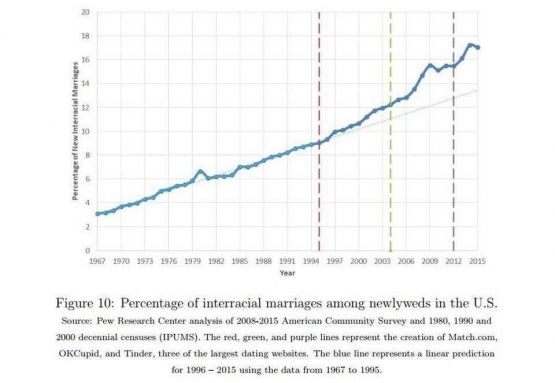One dating app, Tinder, specifically uses a little more complex method that's identical with what Google uses for its search engine, viz. PageRank that assigns people based on their rankings that they get from the 'reliability' and 'desirability' of their profiles in Tinder, which accounts from how many 'likes' they get and give to others.
I love it!
Given the complicated usage of algorithm in its system, it is clear why so many people rely on these apps to find the love of their lives -- it is because of the benefits they generate. They don't just bring together people in ways that have never been practiced before, but also they open up a new trend that society expects, that is the rise in interracial marriage.

Another thing that these dating apps provide is the choice whether you want to be in a 'thick' or 'thin' market. If you want to have more options so you can get exposed with more potential partners, you can choose a general dating app like Tinder. But, if you want to be more specific with what you want, i.e. you want to be partnered with a cowboy, because you just simply think that city folks just don't get it (yup, that's exactly what it says on the website), you can choose an app known as Farmersonly.com.
...but there's this 'assortative mating'
Apart from the lovey-dovey pleasure, there's this flaw that slips away from our attention because we are so drawn into the world of "one swipe away"-kind-of-love. It is the troublesome impact for the economy as a whole. Dating apps, with their material-driven features like educational background and work information, reinforce what we know as assortative mating. Assortative mating is a mating that happen when a person chooses someone that is similar to him/her, in this regard his/her socioeconomic background.
It is not quite a new thing for people to choose their future spouses along socioeconomic line, judging from their alma mater or their salary level, because they are seen somewhat similar to their social class boundaries. With these dating apps, it will definitely be easier for college graduates to find their same-level partners.
This tendency comes from the calculation of most people that if one family has two breadwinners, they are more inclined to form a stable financial foundation for the family. Study has shown that in the United States, 71 percent of college-educated men married a wife who is also college educated in 2007 compared with only 37 percent in 1960.
That study is also supported by data from National Bureau of Economic Research that found the degree of assortative mating based on education has increased between midst 20th century to 21st century. Assortative mating isn't unethical, but it definitely changes how marriage works. What men and women want from a marriage is different nowadays than before. Men don't want a mere homemaker, so do women. They don't want to be partnered with men just for a motive of being provided. They both want partners; partners that can actually work with them together through emotional and financial upheavals (though the later seems to be more prominent).
But aside from that, one consequence that society has to bear is increasing inequality. Between 1960 and 2005 in the United States, which in-between them marked the birth year of two giant dating apps namely Match.com and OKCupid, there was an estimated 25 percent rise of inequality and a rise in Gini coefficient by 0.09 point from 0.34 to 0.43. As we may all know, the rise in Gini coefficient is not a good thing because the more it comes near 1, the bigger is the inequality of one's country. Obviously, there are factors that have driven this rise in inequality, but the way dating apps work might have contributed.









